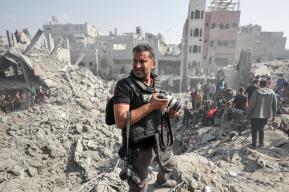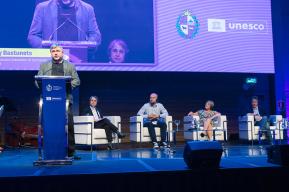Article
Pavla Holcová joins the UNESCO/Guillermo Cano Prize Jury as Zainab Salbi takes the role of Chair

She is the regional editor for the OCCRP (Organized Crime and Corruption Reporting Project) and the founder of the Czech Center for Investigative Journalism, and she will serve on the Jury for a term of three years. Holcová is an award-winning journalist who has been involved in some of the most high-profile cross-border investigations in recent years, including the murders of her colleague Ján Kuciak and his partner Martina Kušnirová in Slovakia in 2018.
Pavla Holcová’s journalism is inspired by curiosity and wanting “to understand how the world really works” and the conviction that “investigative journalism has proven it is the most efficient tool to fight corruption and impunity”. She believes that the biggest challenges to investigative journalism today are “direct attacks on journalists by politicians and a significant drop in trust in media” as well as journalists’ failure “to explain our role in society and what journalism standards we need to follow.”
Holcová is joining the Jury alongside five experienced jurors: Zainab Salbi, Mauricio Weibel, Margo Smit, Mae Azango and Yasuomi Sawa. The former Chair, Alfred Lela has completed his term, and UNESCO thanks him for his good work and contributions.
A new Chair of the Jury
The new Chair of the Jury will be Zainab Salbi. She is a US and Iraqi journalist and human rights activist. She was appointed as the new Chair of the UNESCO/Guillermo Cano World Press Freedom Prize Jury in 2021.
Zainab Salbi sees investigative journalists as “defenders of truth in a time where the concept of truth is attacked” and believes that “journalistic work is the most essential ingredient to keep power in check”. As the founder of two feminist organizations, ‘Women for Women International’ and ‘Daughters for Earth’ which work respectively with war survivors and women climate activists, Zainab Salbi’s journalism is motivated by scrutinizing global politics from the perspective of women.
Both members believe it is crucial to highlight journalists who defend press freedom in difficult circumstances around the world. According to them, their participation in the Jury is a way of making journalists “feel seen, acknowledged and supported” (Zainab Salbi) and “adding an extra layer of protection to the journalists who most need it” (Pavla Holcová).
The UNESCO/Guillermo Cano Prize
The Prize is awarded annually on World Press Freedom Day (3 May) and is accompanied by a US$ 25,000 award. This year’s ceremony will take place in New York.
The Belarusian Association of Journalists received the award in 2022, and its President, Andrei Batsunets accepted it on World Press Freedom Day in Punta del Este in Uruguay. Previous laureates include some of the world’s most prominent investigative journalists. A list of previous laurates is available here.
Nominations are open
The 2023 Call for nominations for the UNESCO/Guillermo Cano World Press Freedom Prize is open. Nominations should be submitted by UNESCO Member States or international and regional NGOs active in the field of press freedom, by filling out the form in English or French and sending it to the UNESCO Secretariat by 15 February 2023.
This Prize was established by UNESCO’s Executive Board, in 1997, in memory of Guillermo Cano, a Colombian journalist who died in the exercise of his profession. Its mission is to recognize each year a person, organization or institution that has made a significant contribution to the defense and/or promotion of press freedom anywhere in the world, particularly where risks are involved.
More information on the Prize is available here.








